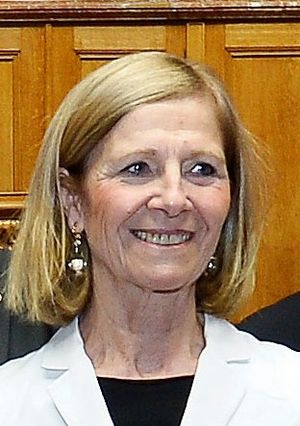Pascale Cossart facts for kids
Quick facts for kids
Pascale Cossart
|
|
|---|---|

Cossart in 2013.
|
|
| Born | 21 March 1948 |
| Alma mater | Lille University, Georgetown University, University of Paris |
| Awards |
|
| Scientific career | |
| Fields | Bacteriology |
| Institutions | Pasteur Institute |
Pascale Cossart (born 21 March 1948) is a famous French scientist. She studies tiny living things called bacteria. She works at the Pasteur Institute in Paris. She is known as the top expert on a very dangerous type of bacteria called Listeria monocytogenes. This bacteria can cause serious illnesses, especially from food.
Contents
Early Life and Education
Pascale Cossart was born in the northern part of France in 1948. She grew up and went to school in a town called Arras.
She studied at Lille University, earning her first degrees in 1968. Later, she went to Georgetown University in the United States. There, she earned a master's degree in chemistry in 1971. She then returned to France.
Becoming a Scientist
Pascale Cossart earned her Ph.D. in biochemistry in 1977. She completed this important degree at the Pasteur Institute and the University of Paris. After her Ph.D., she continued her research at the Pasteur Institute.
Today, she is a Professor and leads a special research group. This group studies how bacteria interact with cells. She has received many important awards for her work. These include the Richard Lounsbery Award and the L'Oreal-UNESCO Award for Women in Science in 1998. In 2013, she was given the Balzan Prize for her research on infectious diseases.
Understanding Bacteria
Pascale Cossart's main research focuses on how certain bacteria cause infections. She is especially interested in Listeria monocytogenes. This bacteria is a type of intracellular bacteria. This means it can live and grow inside human cells.
The Listeria Bacteria
Listeria is a bacteria that often spreads through food. It can cause many serious illnesses. Sadly, about 30% of people who get sick from Listeria do not survive.
Scientists study Listeria because it is very tough. It can survive in many different types of cells. It can also cross important barriers in the body. These barriers include the blood–brain barrier, the gut lining, and the placenta during pregnancy.
How Listeria Causes Illness
Dr. Cossart's work has helped us understand how Listeria is so effective and dangerous. She found out how the bacteria uses its genes and chemicals to cause disease. For example, she identified a gene called bsh. She also discovered how Listeria uses a special RNA "thermosensor." This sensor helps the bacteria control which genes are active based on temperature.
Her team also learned how Listeria gets inside cells. They found out how it crosses the body's protective barriers. One major discovery was how a Listeria protein, called internalin, connects with a human cell receptor, E-cadherin. This connection is how the bacteria can cross the placental barrier. This was the first time scientists fully understood this process.
Mapping Bacterial Genes
In 2009, Dr. Cossart published a special "bacterial operon map." This map shows how Listeria's genes are controlled. It explains how the bacteria behaves in different environments. By comparing Listeria from soil and from the human gut, she found new things. She identified non-coding RNAs that make Listeria more harmful. She also found other ways that genes are controlled.
Important Recognitions
Pascale Cossart has received many awards and honors for her groundbreaking work. These awards recognize her important contributions to science.
- Carlos J. Finlay Prize for Microbiology (1995)
- Richard Lounsbery Award (1998)
- Helena Rubenstein / UNESCO Award for Women in Science Leadership (1998)
- Corresponding member, French Academy of Sciences (1999)
- Robert Koch Prize (2007)
- Louis-Jeantet Prize for Medicine (2008)
- Foreign member, Royal Society of London (2010)
- Balzan Prize (2013)
- FEBS/EMBO Women in Science Award (2014)
- Ernst Jung Gold Medal for Medicine (2017)
- Heinrich Wieland Prize (2018)
- Grand officier of the Legion of Honor (2020)
See also
 In Spanish: Pascale Cossart para niños
In Spanish: Pascale Cossart para niños
 | Victor J. Glover |
 | Yvonne Cagle |
 | Jeanette Epps |
 | Bernard A. Harris Jr. |

